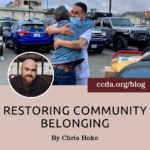A Call for a (W)holistic Approach to Education Equity
by Lorenzo Watson
Higher education student loan debt has become a hot topic in the current political debate, with several presidential candidates calling for either full or partial student loan forgiveness. And as student loan debt levels reach historic highs, it is clear this is a problem worth solving. One only needs to look back to the Great Recession to see how widespread out-of-control debt can shock the entire U.S. economy. The student loan debt crisis does not exist within a vacuum, however, and can be compounded by several issues that also need addressing.
To begin with, we must address the skyrocketing costs for a college education in this nation. Long gone are the days for which a student could simply cover their educational expenses with a part-time job. When you compare the menial wages students can earn at a part-time job with the high costs of college tuition, fees, room and board, and books, it becomes evident that most part-time work is inadequate to meet students’ financial needs.
Of equal importance, is the lingering achievement gap between students of various races and ethnicities. Latinx and African-American students continue to graduate at a lower percentage than their white peers. This is especially true for Latinx and African-American students who come from less affluent homes. Look no further than the STEM academic field for an example. In STEM majors, African-American students are more likely to either leave STEM and graduate with a different degree or to leave college altogether when compared to all students of other races and ethnicities. Yes, student debt is a problem. Still, we must remember that student loan debt presents the most significant difficulty for those students who have taken loans to start school, but then never finish it.
In addition, we are still fighting against student hunger and homelessness, against inequitable distribution of financial aid, against bullying and sexual assault, against racism and stereotype threats, against so many issues that put our students at risk for losing not only their chance at a quality education, but in some cases, at risk for losing their lives. These are not easy problems to solve. No one action will eradicate all unnecessary obstacles from the higher education experience. Instead, this work requires a (w)holistic approach and solution.
One of the eight fundamental principles of Christian Community Development, as espoused by the Christian Community Development Association (CCDA) , is that all community development work must take a (w)holistic approach –– the ‘w’ represents wholeness. In the fight for education equity for all students, this means that we work while knowing there is never a simple answer to the problems we seek to resolve. Instead, we work with others in our community to deal with the spiritual, social, economic, political, cultural, emotional, physical, moral, judicial, educational, and familial issues of each student.
CCDA, by way of its #transformED justice initiative, is doing just that. CCDA has created a space for civil discourse around (w)holistic solutions to the issues plaguing education in our country. Our students’ lives are at stake, so passion is expected, and neighborly love is required. From Nov. 18 – 22, CCDA’s #transformED community will participate in American Education Week. This week is an excellent opportunity to engage in activities and conversations about (w)holistic solutions promoting educational equity. Let us find solutions that help our students to pay off existing debt while reducing their need to create the debt in the first place. Let us find solutions that help our students find paths of resilience while addressing the environmental stressors that impede their progress. Let us find (w)holistic solutions that meet our students’ immediate needs while building equitable systems for academic progress.
Originally appeared in Sojourners Magazine on Nov. 15, 2019.

Lorenzo Watson is an active member in the CCDA community. He graduated from NC State University and Shaw University Divinity School with a BS in Computer Engineering and an M.Div respectively. He is currently pursuing a PhD in Higher Education at NC State University. He resides in Kerrville, Texas, with his wife, Natarsha Sanders.





